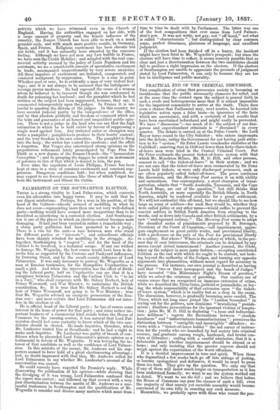THE ARCHBISHOP OF PARIS.
MURDER perpetrated in a church shooks more than the ordinary feelings of humanity ; and the sacred character of the place is no doubt one reason why we have so few instances, although assassination from religious motives have not been so rare. It is a remarkable and not an uninstructive fact, that the rare instances of assassinations in church have not only constituted intrusions upon a sanctuary, but have in one way or other direetIT involved tho clergy as actors or sufferers. Thomas a'Beekett tell in his own church ; and the only other instance of assassination within the sacred building that we recall is that of Giuliano do' Medici, the brother of Lorenzo ; which is remarkable for presenting the per sonages of the drama in a reversed position to that which they filled in the scene at Paris. The object was to kill Lorenzo as well as Giuliano ; and among the conspirators present, although he was not the actual assassin, was an archbishop. That prolate belonged to the Salviati family ; but his high connexions did not prevent his suffering for the crime, for he was hanged in his canonicals, out of a window of the prisonlike palace in the Piazza del Grandma at Florence.
But although not in church, religion has often been tho instigator of assassination, to say nothing of wholesale massacres and destructive plots, like our Gunpowder Plot in England or the Eve of St. Bartholomew in France. Protestantism is not immaculate in this respect ; but the Papal Church must confess to a large share of such examples for its clergy and its flock. No wonder, then, if Henry the Third found the exterminator of his debaucheries in Jacques Clement the monk ; or if Henry the Fourth encountered final refutation at the hands of Ravaillac. An assassination which must have been more shocking than any of these, or even than that of Archbishop Sibour, was the murder of the Emperor Henry the Seventh : the host itself was made the instrument of his death, for he was poisoned in a sacramental wafer. The very name of the building in which the Archbishop of Paris was killed recalls to mind a religious murder : the church was dedicated to St. Stephen, and among those who assisted at the stoning of the martyr was the Jewish fanatic Saul, afterwards the converted, the penitent, and eloquent apostle Paul —the same man who wrote the beautiful eulogium on charity. " Tantum relligio !" Christianity has not redeemed itself from the sneer of the heathen sceptic.
We may recall historical parallels, and ascribe the death of Archbishop Sibour to causes which have prevailed from the earliest days of Christianity, and have been especially and paradoxically immortal in the Church of Rome ; but there can be no doubt that the crime, occurring in France at the present day, will create a very painful feeling. Assassination is not a thing which it is safe to talk about in that excitable country, so fond of classic) models, especially assassination striking down those who stand high. We are told that Verger is mad—that he has always been turbulent and over-excited, and was not a responsible agent. It may be so ; but what circumstances can so directly conspire to multiply the inmates of lunatic asylums as the movements which we have witnessed in Franco for many years ? In a kind of muffled form, almost all the causes of popular mental excitement have been at work. "The Revolution" has been kept under, but it has never been formally, deliberately, and willingly superseded by the people : the fire is covered,. not extinguished; and that it survives is proved by the unremitting e?certton necessary to keep down any elements of disorder. Since 1848 the clergy have made the most of the reaction upon the utilitarian spirit of the Citizen King's day. Rome has been active everywhore; and although she is just now deploring the loss of her power in Switzerland, in Mexico, in Belgium, in Sardinia„—in all places where republican or constitutional forms of government exist and flourish,—she has to a great extent succeeded in bringing about that same High Church excitement and over activity, which we have witnessed even in the Church . of England. Having the authorities engaged on her side, with a large amount of property and the female influence of the country, the Roman Church has been able to work on a much grander scale, and with much more positive results, in Germany, Spain, and France. Religious excitement has been chrome but not feeble, and it has naturally been attended by the converse feeling. Although we have not seen any Law bubble in France, we have seen the Credit Mobilier ; and mingled with the real commercial activity aroused by the policy of Louis Napoleon and his assistants, we see a considerable amount of speculative excitement in trade, accompanied unquestionably by very severe anxieties. All these impulses of excitement are irritated, exasperated, and rendered malignant, by suppression. Verger is a case in point. Whether mad or sane, he is evidently a man of very violent feelings; and it is not always to be assumed that the indulgence of revenge proves madness. He had espoused the cause of a woman whom he believed to be innocent though she was condemned to death for poisoning her husband ; and the pamphlet which he had written on the subject had been suppressed, because, they say, it commented intemperately upon the judges. In France it is unlawful to question the dictum of the judges. In this country we have secured judicial purity by the independence of the office, and by that absolute publicity and freedom of comment which are the tests and guarantees of an honest and unqualified public opinion. There is not a judge in the land who can say that the high estimation in which he is held exists by favour of suppressing a single word against him. Any irritated suitor or champion may write a pamphlet ; pamphleteers produce to their hearts' content; and the very freedom is its own corrective. The pamphlet is flung into the heap ; the writer has vented his emotions ; and the affair is forgotten. But Verger also entertained strong opinions on the preposterous refinement lately promulgated by Pope Pius the Ninth as a new dogma of the Roman Church—the "Immaculate Conception " ; and in grasping the dagger he seized an instrument of polemics in lieu of that which is denied to him, the pen.
Ever since the expulsion of Louis Philippe, France has been kept at once in a state of constant excitement and constant suppression. Dangerous conditions both ; but when combined, we may expect to see fevered excesses like those of which Verger has been the instrument and Sibour the victim.





























 Previous page
Previous page